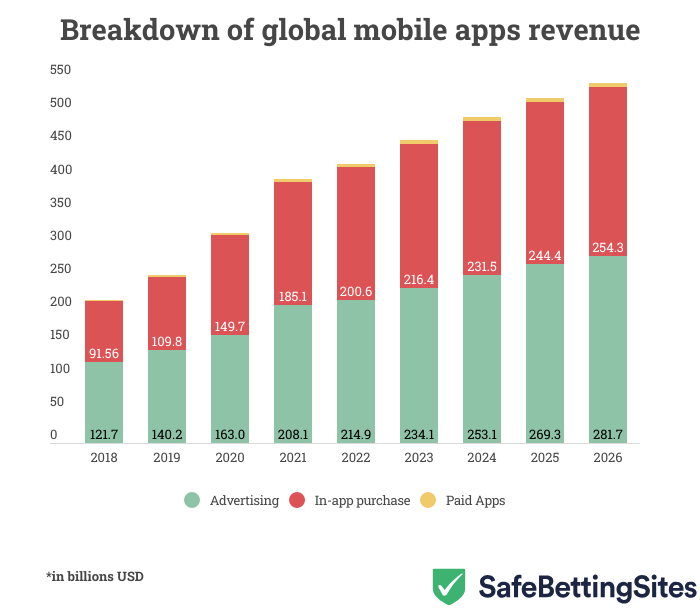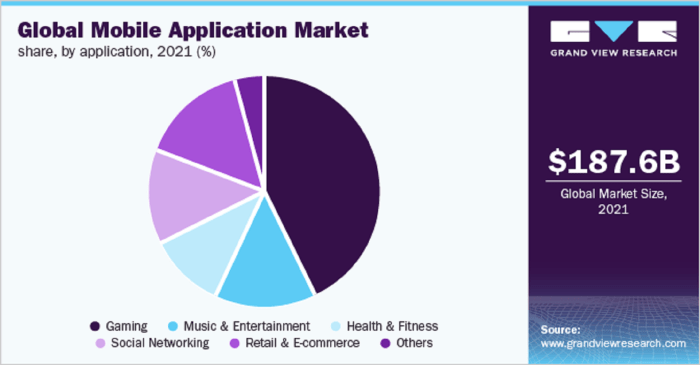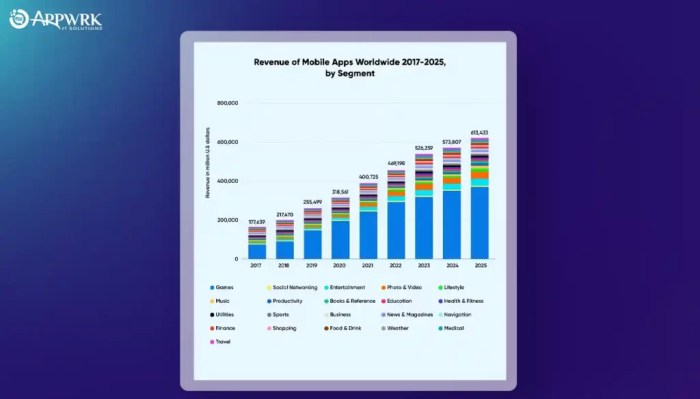
Delving into the dynamic world of mobile app market value, we uncover its importance and growth trends. Stay tuned for a deep dive into this thriving sector.
The mobile app market has seen exponential growth over the years, with its value becoming increasingly significant in the tech industry.
Overview of the mobile app market

The mobile app market refers to the buying and selling of mobile applications, including those for smartphones, tablets, and other mobile devices. It involves the development, marketing, and distribution of these applications to users through app stores like Google Play Store and Apple App Store.
Significance of the mobile app market in the tech industry
The mobile app market plays a crucial role in the tech industry as it drives innovation, enhances user experience, and generates substantial revenue for developers and companies. Mobile apps have become an integral part of our daily lives, offering solutions for communication, entertainment, productivity, and more.
Statistics on the growth of the mobile app market over the years
- In 2020, global mobile app revenue reached $581.9 billion, with a significant increase from the previous years.
- The number of mobile app downloads worldwide is projected to grow to 258.2 billion by 2022.
- The mobile app market is expected to continue expanding with the rise of new technologies like augmented reality (AR) and artificial intelligence (AI) in app development.
Factors influencing the mobile app market value
The value of the mobile app market is influenced by various factors that play a crucial role in determining the success and profitability of apps.User Demand:User demand is a significant factor that directly impacts the value of the mobile app market.
The popularity and acceptance of an app among users can drive its market value up. Apps that cater to the needs and preferences of a large user base are more likely to generate higher revenue and increase their overall market value.
Competition
Competition in the mobile app market is intense and can greatly affect the value of apps. With millions of apps available in app stores, developers must compete with each other to gain visibility and attract users. The level of competition can influence pricing strategies, user acquisition costs, and overall market share.
Apps that offer unique features or provide a superior user experience are better positioned to thrive in a competitive market and increase their value.
Revenue models in the mobile app market

Revenue models in the mobile app market play a crucial role in determining the financial success of apps. Different revenue models are utilized by mobile apps to generate income and sustain their operations.
Comparing and Contrasting Revenue Models
Various revenue models are employed by mobile apps to monetize their offerings. Let's compare and contrast some common revenue models:
- Freemium:This model offers basic features for free but charges for premium features or content.
- Subscription:Users pay a recurring fee to access the app's content or services.
- In-App Advertising:Ads are displayed within the app, and revenue is generated through clicks or views.
- In-App Purchases:Users can buy virtual goods or upgrades within the app.
Effectiveness of In-App Purchases
In-app purchases have proven to be a lucrative revenue model for many mobile apps. By offering users the ability to buy virtual goods or upgrades, developers can generate significant revenue. The key to success with in-app purchases lies in offering valuable and enticing items that enhance the user experience.
Impact of Subscription-Based Models
Subscription-based models have gained popularity in the mobile app market due to their ability to provide a steady stream of revenue. By offering users access to premium content or services for a recurring fee, app developers can establish a reliable source of income.
However, it is essential to continuously deliver value to subscribers to retain them and justify the subscription cost.
Emerging trends in the mobile app market

As the mobile app market continues to evolve rapidly, several emerging trends are shaping the value of mobile apps. These trends are influencing the way developers, businesses, and users interact with mobile applications, ultimately impacting market value.
Influence of Artificial Intelligence
Artificial Intelligence (AI) is playing a significant role in enhancing the value of mobile apps. By leveraging AI technologies such as machine learning and natural language processing, mobile apps can offer personalized experiences, predictive analytics, and advanced automation features. This not only improves user engagement but also increases the overall value of the app in the market.
Role of Mobile App Analytics
Mobile app analytics have become crucial in predicting market value by providing valuable insights into user behavior, preferences, and trends. By analyzing data related to app usage, retention rates, in-app purchases, and user feedback, developers can make informed decisions to optimize their apps for better performance and user satisfaction.
This data-driven approach helps in enhancing the market value of mobile apps.
End of Discussion
In conclusion, the mobile app market value continues to evolve, driven by various factors and revenue models. Stay informed about the latest trends to make the most of this lucrative market.
Top FAQs
What factors influence the value of the mobile app market?
Key factors include user demand, competition, and technological advancements.
How effective are in-app purchases as a revenue model for mobile apps?
In-app purchases have proven to be a lucrative revenue stream for many apps, capitalizing on user engagement.
What are some current trends shaping the mobile app market value?
Emerging trends include AI integration, personalized user experiences, and data-driven analytics.











